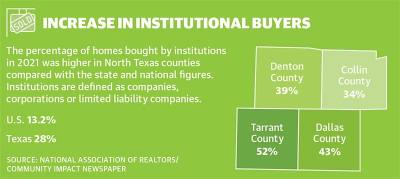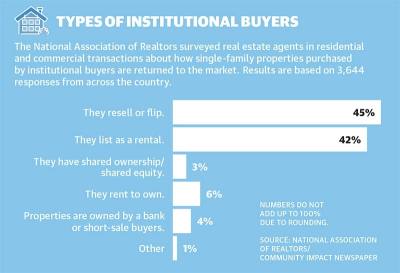A report released in May by the National Association of Realtors shows Collin, Dallas, Denton and Tarrant counties had among the highest percentage of institutional buyers of anywhere in the nation when it came to residential home sales last year.
The association defined institutional buyers as companies, corporations or limited liability companies.
Tarrant County was the third highest in the nation with 52% of all home sales last year going to companies, according to the report. Dallas County came in seventh with 43%, Denton County was 11th with 39%, and Collin County tied for 20th place with 34%, the report showed.
Nationwide, institutional buyers made up 13% of the residential sales market in 2021, the report stated.
Among states, Texas had the highest percentage of institutional buyers with 28%, the report stated. That is a 4.6% increase from the institutional buyer share in 2020, according to the report.
The association’s report found the increase in institutional buyers reduced available housing stock, creating a more competitive real estate market for individual buyers and increasing the number of rentals. That, in turn, led to a higher turnover rate, according to the report.
“The major reason homeowners sold to institutional buyers was because they offered cash, purchased the property ‘as is,’ or offered a guaranteed purchase,” according to the report.
More institutional buyers may also change a community.
“If the investor makes high-quality repairs and updates to the properties, then it could be an improvement to a neighborhood,” said Taylor Walcik, president of the MetroTex Association of Realtors based in Grapevine. “If the investor makes lower-quality modifications to a property, it could definitely go the other way and make the neighborhood not as appealing as it should be.”
Umit Gurun, who holds the position as the Ashbel Smith professor of accounting at The University of Texas at Dallas, researched the trend of institutional homebuyers in DFW.
He said there were two main shifts in the marketplace with these institutional investors.
“One of them is that they become a big landlord,” Gurun said. “So they become the biggest landlord in the area, which gives them pricing power, which means they can increase the rent at higher levels, so that is kind of a monopoly on pricing.”
The other shift he observed is institutional owners’ ability to repair houses at cheaper prices.
“If you go to an area where a majority of the houses are owned by a landlord, you end up paying higher prices, but at the same time these institutional investors help the neighborhood through some amenities,” Gurun said.
With institutional buyers, home prices are likely to increase, said Marissa Benat, president of the Collin County Association of Realtors.
“Where buyers will win is that overpriced homes are going to stand out much more if a home doesn’t sell due to price or condition,” Benat said. “Price can overcome a lot of conditions, but consumers should question why a particular home has longer days on market than comparable sales.”
Institutional buyers have also been changing the way they approach purchases. Shelby Kimball, manager at Kimball Real Estate in Fort Worth, said he is seeing institutional buyers in Tarrant County take different approaches compared to previous years.
“We used to see more institutional buyers come in with lower offers, but now, to me what’s really changed is that the offers from institutional buyers are [at] asking price or above and all in cash still. ...,” Kimball said. “It’s hard for other individual buyers to compete with that.”







